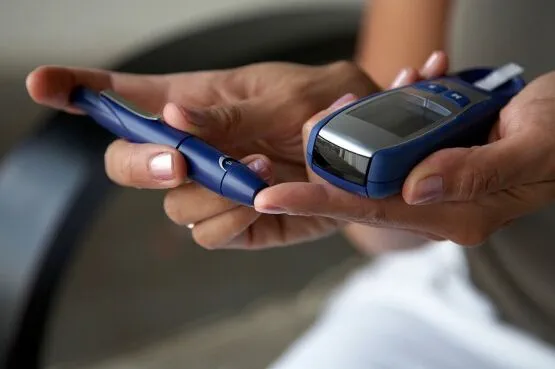How to keep your eyes healthy and protect your vision
We often use our eyes without even thinking about it. But do you know how to keep them healthy? And how can you protect your vision? Here, I list my top tips to help look after your eye health.

Why is it important to protect our eyes?
Our eyes are an important part of our bodies and we often use them to help navigate the world around us. But they can be easily damaged. So, we need to take steps to look after them to help prevent injury, and to keep our eyes healthy for as long as possible.
How should healthy eyes look and feel?
Healthy eyes shouldn’t feel dry, sore or be watery. Your eyesight shouldn’t be blurry (when wearing your glasses, if you need them). You also shouldn’t experience any bright spots or floaters (tiny specks that move across your eye). If you have any of these symptoms, contact your local optician.
How can I protect my eyes?
Below are some ways you can protect your eyes and help take care of your vision.
- Wear protective eyewear when doing DIY. This is essential, especially if you’re drilling, hammering, or using chemicals. So, make sure to pick up a pair from your local hardware shop before starting your next project.
- Have regular eye tests. Regular eye tests help to make sure you have the right glasses, if you need them. Eye tests can also detect problems with your eyes. Early detection of many eye conditions can help to prevent sight loss, so don’t delay your next eye test.
- Wear sunglasses. Ultraviolet (UV) rays from the sun can increase your risk of eye cancer and cataracts. So, it’s important to protect your eyes from them. Choose sunglasses that are CE marked and have a UV filter for the best protection.
- If you smoke, stop smoking. Smoking is linked with an increased risk of eye conditions like macular degeneration and cataracts.
How can I protect my eyes when using a computer?
Lots of us use computers daily, whether that be at work or at home. But long periods of time spent staring at the screen can lead to eye strain.
If you work with computers, your employer can carry out a workstation assessment to help reduce any risks. They should also provide training on how to use your computer safely.
When at home, following the steps below can help to protect your vision.
- Make sure that your computer screen is properly positioned. The screen should be between 50 and 60 cm away from your face. Your eyes should be level with the top of your screen.
- Keep your screen free from dust and dirt so that you can see it clearly.
- Adjust text size so that it’s comfortable and easy for you to read.
- Make sure there’s no glare from lights or windows reflecting onto the screen, as this can make it harder to see.
- Remember to blink. Focussing on a screen can make you blink less often, which can make your eyes feel dry and uncomfortable.
- Wear your glasses if they are recommended for use when looking at a computer screen.
It’s also important to take regular breaks from the computer to give your eyes a rest. It’s a good idea to follow the ‘20/20/20 rule’. This is the idea that every 20 minutes, you should try to move your eyes to look at an object that’s at least 20 feet away, for at least 20 seconds.
If your eyes feel strained after taking regular breaks, contact your optician.
How often should I have my eyes tested?
It’s recommended that you have an eye test every two years. But, if you have an existing eye condition you might need to have checks more often.
Which foods are good for eye health?
Having a balanced diet full of vitamins and minerals is a great way to look after your general health.
Some studies suggest that omega-3 fatty acids (a type of fat found in fish like mackerel and salmon) may be beneficial for eye health.
How can I reduce eye strain when reading?
Wearing glasses with the right lenses for you is the best way to make reading easier. But, there are other things you can do. Why not try:
- adjusting the colour or contrast settings on electronic devices to make text easier to read
- choosing books with larger font to help with reading
- increasing the text size on your phone and computer to help reduce the strain on your eyes
If you experience any symptoms between eye tests that are worrying you, or affecting your vision, speak to your optician or doctor.
Are you interested in learning more about your health? Discover more about our range of health assessments.
-
Sources Sources
- 6 most frequent eye injuries. Optometrist’s Network. Optometrists.org. Published 2 September 2021.
- Dry eye syndrome. Association of Optometrists. Aop.org. Accessed January 2023.
- Floaters. National Eye Institute. Nei.nih.gov. Published 22 September 2020.
- Protective eyewear what you need to know. The Association of British Dispensing Opticians (ABDO). Abdo.org.uk. Accessed January 2023.
- The importance of having your eyes tested regularly. UCL Institute of Ophthalmology. Ucl.ac.uk. Accessed January 2023.
- Eye care, vision impairment and blindness. World Health Organization (WHO). Who.int. Accessed January 2023.
- Risks and causes of eye cancer. Cancer Research UK. Cancerresearch.org. Last reviewed 17 November 2021.
- The Sun & Your Eyes. Skin Cancer Foundation. Skincancer.org. Last reviewed June 2019.
- Protecting your eyes. Macular Society. Macularsociety.org. Last reviewed February 2022.
- Sun safety. Cancer Research UK. Canceresearchuk.org. Last reviewed 1 June 2021.
- Smoking and tobacco: applying All Our Health. Office for Health Improvement & Disparities. Gov.uk. Last updated 5 April 2022.
- Vision loss, blindness and smoking. Centers for Disease Control and Prevention (CDC) cdc.gov. Last reviewed 5 May 2022.
- Working safely with display screen equipment. Overview. Health and Safety Executive (HSE). Hse.gov.uk. Accessed January 2023.
- Working safely with display screen equipment. Training and information. Health and Safety Executive (HSE). Hse.gov.uk. Accessed January 2023.
- Working with display screen equipment. Health and Safety (Display Screen Equipment) Regulations 1992 as amended by the Health and Safety (Miscellaneous Amendments) Regulations 2002. Guidance on Regulations. Accessed January 2023.
- Computers, digital devices and eye strain. American Academy of Ophthalmology (AAO). Aao.org. Last reviewed 3 March 2020.
- The routine eye examination (‘sight test’) Guidance for Professional Practice. The College of Optometrists. Accessed January 2023.
- Omega-3: Food Fact Sheet. The Association of UK Dieticians (BDA). Bda.uk.com. Accessed January 2023.
- Downie LE, Ng SM, Lindsley KB, Akpek EK. Omega-3 and omega-6 polyunsaturated fatty acids for dry eye disease. Cochrane Database Syst Rev. 2019 Dec 18;12(12):CD011016. doi: 10.1002/14651858.CD011016.pub2.
- Reading Tips For People With Low Vision. Optometrists Network. Optometrists.org. 3 May 2021.
About our health information
At Bupa we produce a wealth of free health information for you and your family. This is because we believe that trustworthy information is essential in helping you make better decisions about your health and wellbeing.
Our information has been awarded the PIF TICK for trustworthy health information. It also follows the principles of the The Information Standard.

More general health advice articles
Did you find our advice helpful?
We’d love to hear what you think. Our short survey takes just a few minutes to complete and helps us to keep improving our healthy lifestyle articles.
Legal disclaimer
This information was published by Bupa's Health Content Team and is based on reputable sources of medical evidence. It has been reviewed by appropriate medical or clinical professionals and deemed accurate on the date of review. Photos are only for illustrative purposes and do not reflect every presentation of a condition.
Any information about a treatment or procedure is generic, and does not necessarily describe that treatment or procedure as delivered by Bupa or its associated providers.
The information contained on this page and in any third party websites referred to on this page is not intended nor implied to be a substitute for professional medical advice nor is it intended to be for medical diagnosis or treatment. Third party websites are not owned or controlled by Bupa and any individual may be able to access and post messages on them. Bupa is not responsible for the content or availability of these third party websites. We do not accept advertising on this page.







